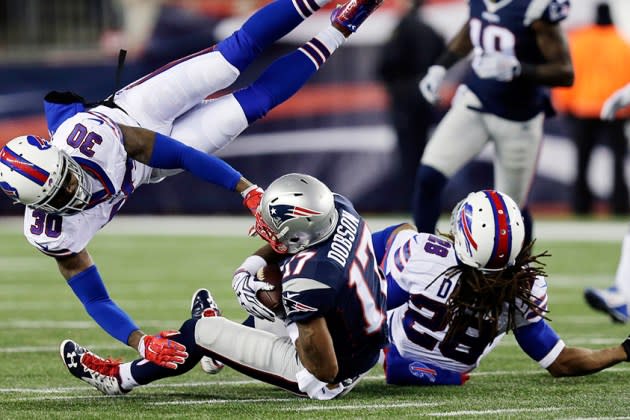Disney, Charter Settle Cable Dispute Hours Before Debut of ESPN’s ‘Monday Night Football’

Disney and Charter have decided to let ESPN sports take the field on traditional cable after all.
The two media giants, battling for the past week over a renewal for carriage of Disney’s various cable networks on Charter’s major-market cable systems, have come to new terms, according to the companies. The deal puts Disney networks like ESPN and ABC back on Charter’s cable service, but also allows Charter to drop several of them, even as Disney gains new distribution for some of its streaming services, hoping that new audiences will increase the value of such properties to advertisers. The squabble, even though settled, has the potential to echo in the media sector for months to come as distributors push back on major programmers like Disney that are increasingly putting more of their best content on stand-alone streaming services.
More from Variety
'Toy Story' Characters Hit the Gridiron in Disney Bid to Woo Young Viewers to NFL
Media Companies Keep Turning to Gambling. It's Not What You Think
While cable networks were at the center of the fight between the two companies, much of the deal has to do with the potential of broadband. Under terms of the new pact, Disney will make the ad-supported version of Disney+ available to as many as 9.5 million subscribers “under a wholesale arrangement,” while making ESPN+ available to those same customers. And Disney agreed to make the flagship version of its ESPN direct-to-consumer product — long speculated as a major step for the company — available to Charter’s Spectrum customers “when it launches.”
The deal, said Jimmy Pitaro, chairman of Disney’s sports businesses, was aimed at both protecting the company’s linear TV business while helping to “help us “continue to ease sports fans into the direct-to-consumer environment.”
Charter won the flexibility to offer a range of video packages at varying price points based upon different customer viewing preferences — potentially a significant capitulation, because most programmers have long forced cable and satellite distributors to bundle many of its networks together, forcing subscribers to pay for options they may not watch regularly. Charter is also expected to offer Disney’s direct-to-consumer services to all its customers, particularly its broadband-only customers–– for purchase at retail rates. These include Disney+, Hulu and ESPN+, as well as The Disney Bundle.
Disney agreed to let Charter drop carriage of some prominent cable networks, including Freeform, Disney Junior, Disney XD. Nat Geo Mundo, Nat Geo Wild, FXM, FXX and Baby TV. A portion of the content from these networks remains available on other cable properties Charter will carry, or can be found on Disney+ or Hulu. While Hulu is not made part of the deal, Disney is slated to unveil a new product that will allow Disney+ subscribers to toggle to Hulu within the same app.
“This is a new model of a deal in this space,” said Dana Walden, co-chairman of Disney Entertainment, in an interview. “It is the most modern deal we have ever done and it received tremendous scrutiny on both sides about what the trade offs were and with respect to the true priority of each of the companies negotiating.”
The agreement reflects new and pressing needs felt by each side. Disney is eager to win new customers to the ad-supported tier of Disney+, which it sees as a more affordable alternative to the stand-alone service, while Charter sees broadband as its main and most attractive offering in years to come.
The two sides came to an impasse earlier this month, with Disney pulling ESPN, ABC, and other big TV networks from Charter’s systems on the cusp of the start of both the NFL and college-football seasons. Charter’s systems include some that serve New York City and Los Angeles, two of the biggest media markets in the country. Charter’s Spectrum cable service has just under 15 million subscribers.
Carriage disputes have become increasingly common in the media industry, as programmers and distributors seek to keep revenue from linear TV flowing as customers jump to digital venues for their news, sports and entertainment. But this one raised eyebrows. Charter said it could no longer agree to pay higher rates for the same set of Disney cable networks when the company was losing video subscribers in droves. Charters said nearly 25 million customers, or 25% of the base of multichannel video programming distributors, have canceled their subscriptions over the last five years, and said it felt a rate hike for Disney would require that its basic cable subscribers gaining access to Disney+ at no extra charge, a request that made Disney executives balk.
Some of the terms of the pact could play a part in negotiations between other programmers and distributors. Others are likely to examine the performance of individual cable networks and the need to line subscribers up for new streaming hubs. There could be other kinds of trade offs in the future. “What this deal represents is there is no longer a homogeneity to different partners. Different companies are in different businesses,” Walden said. “Some are satellite, some are cable or broadband, and we are looking to create a more bespoke approach.”
.
Best of Variety
Oscars Predictions: Best Actor - There Will Be Blood in the Lead Actor Race
Everything We Know About 'I Am Legend 2,' Starring Will Smith and Michael B. Jordan
Sign up for Variety’s Newsletter. For the latest news, follow us on Facebook, Twitter, and Instagram.

